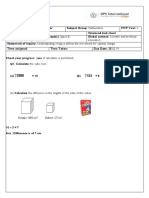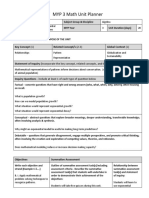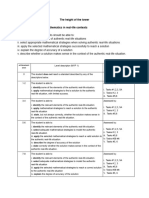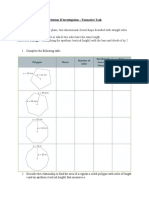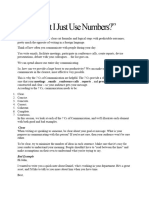MYP2 Rates
MYP2 Rates
Uploaded by
Yomna SherifCopyright:
Available Formats
MYP2 Rates
MYP2 Rates
Uploaded by
Yomna SherifCopyright
Available Formats
Share this document
Did you find this document useful?
Is this content inappropriate?
Copyright:
Available Formats
MYP2 Rates
MYP2 Rates
Uploaded by
Yomna SherifCopyright:
Available Formats
Teacher(s Subject group and Math
) discipline
Unit title Rates MYP year 2 Unit duration
(hrs)
Inquiry: Establishing the purpose of the unit
Key concept Related concept(s) Global context
Relationships Equivalence, measurement Globalization and sustainability:
Interconnectedness of human-made
systems
Statement of inquiry
Establishing relationships of equivalence between measurements illustrates the interconnectedness of human-made systems.
Inquiry questions
Factual— What is a rate? What does it mean to be equivalent?
Conceptual— How are relationships of equivalence established?
Debatable— How can ‘different’ still be equivalent? Do our different systems hinder our interconnectedness?
Middle Years Programme Unit planner 1
Objectives Summative assessment
A: Knowing and understanding Outline of summative assessment task(s) Relationship between summative
including assessment criteria: assessment task(s) and statement of
i. select appropriate mathematics inquiry:
when solving problems in both
familiar and unfamiliar situations
ii. apply the selected mathematics Unit Test: (criterion A)
successfully when solving The Unit Test will allow students to apply
problems In this task, students will answer a wide
the content they have learned to a wide
iii. solve problems correctly in a range of questions, from simple to
range of questions and verify that they
variety of contexts. complex to challenging (in both familiar
can establish relationships of equivalence
and unfamiliar situations), all related to
between different measurements. Many of
B: Investigating patterns relationships of equivalence that exist
the questions will include applications
among different systems of measurement.
involving human-made systems.
i. select and apply mathematical In particular, students will convert between
problem- solving techniques to different currencies and different systems
discover complex patterns of linear measurement. The test will be
ii. describe patterns as relationships completed individually during one class
and/or general rules consistent period.
with findings
iii. verify and justify relationships
and/or general rules.
Investigation: Unit Rates (criterion B)
C: Communicating In this task, students will develop the This investigation establishes
process for calculating unit rates. They will relationships of equivalence between a
i. use appropriate mathematical be given different scenarios and asked to variety of measurements. It will help
language (notation, symbols and find an equivalent ratio that is compared to students discover and develop a basic
terminology) in both oral and a measurement of “one” (e.g. one hour, skill that will then allow them to compare
Middle Years Programme Unit planner 2
written explanations one euro, etc.). From their work, they will and convert across human-made
ii. use appropriate forms of generalize the procedure for determining systems.
mathematical representation to the unit rate given any ratio of
present information measurements. The investigation will be
iii. move between different forms of done during one class period under test
mathematical representation conditions.
iv. communicate complete and
coherent mathematical lines of
reasoning Holiday Travels: (criteria C, D)
v. organize information using a In this task, students will create an
logical structure. In the Holiday Travels task, students use
itinerary for a holiday trip to five different relationships of equivalence (rates) in a
countries. Students will research travel, wide range of ways as they plan and
D: Applying mathematics in real-life accommodations, meals and sights in
contexts budget for a trip. They will see how
each location in local currencies. They will different monetary systems (which are
then convert these amounts to their own human-made) are connected as well as
i. identify relevant elements of currency to arrive at a budget for the entire
authentic real-life situations different systems of measurement as they
trip. Additional questions related to travel, calculate the length of time for each leg of
ii. select appropriate mathematical buying goods and finding a job in the local
strategies when solving authentic their trip. They will experience how being
country will require students to further familiar and adept at moving between
real-life situations apply the rates that they have been
iii. apply the selected mathematical different human-made systems allows
learning all unit. The final product will be a them to make good decisions.
strategies successfully to reach a report that includes a map and itinerary as
solution well as detailed calculations for the cost of
iv. explain the degree of accuracy of the trip.
a solution
v. explain whether a solution makes
sense in the context of the
authentic real-life situation.
Middle Years Programme Unit planner 3
Approaches to learning (ATL)
In order for students to develop as inquirers, students will make guesses, ask ‘what if’ questions and generate testable hypotheses
(Thinking: Creative thinking skills). The strategy students will learn and practice is “I wonder…” where they will pose their own
“what if?” questions related to content that they have just learned. They will be encouraged to look beyond just skill development
and to wonder aloud. These will be discussed with a peer before sharing and exploring as a class.
In order for students to develop powers of abstraction, students will draw reasonable conclusions and generalizations (Thinking:
Critical thinking skills). Throughout the unit, students will be asked to develop theories and procedures, make connections between
topics, and analyze information. These will help them develop their ability to reason quantitatively and abstractly, which is a
necessary skill to develop as a mathematician, and be successful in future mathematics courses.
Action: Teaching and learning through inquiry
Content Learning process
Learning experiences and teaching strategies
Middle Years Programme Unit planner 4
Formative assessment
Differentiation
Resources
Reflection: Considering the planning, process and impact of the inquiry
Prior to teaching the unit During teaching After teaching the unit
Middle Years Programme Unit planner 5
Middle Years Programme Unit planner 6
You might also like
- EST EST3 v3.0 Programming Manual PDFDocument176 pagesEST EST3 v3.0 Programming Manual PDFHernan Rea50% (2)
- Unit 1 - Number System-1 PDFDocument7 pagesUnit 1 - Number System-1 PDFAmna Ali100% (2)
- Omer G G10 Summative Assessment - Criterion C and D QuadraticsDocument10 pagesOmer G G10 Summative Assessment - Criterion C and D QuadraticsOmerG100% (2)
- Unit 3 SummativeTest ADocument4 pagesUnit 3 SummativeTest AShalom Hasiana Gracia-Eirene NainggolanNo ratings yet
- SA Quadratic Function Criterion DDocument3 pagesSA Quadratic Function Criterion DКамиля Кокенова100% (3)
- Summative Assessment Unit 1 - MYP 4Document5 pagesSummative Assessment Unit 1 - MYP 4Lorraine SabbaghNo ratings yet
- G9 U1 Math MYP Unit Planner 20182019Document6 pagesG9 U1 Math MYP Unit Planner 20182019Ayuu Nur AfifahNo ratings yet
- MYP3 Math Unit Planner - GeometryDocument12 pagesMYP3 Math Unit Planner - GeometryKelly Orosz100% (1)
- MYP 2 IntegersDocument6 pagesMYP 2 IntegersYomna SherifNo ratings yet
- Unit Plan Math Myp2 1st MPDocument23 pagesUnit Plan Math Myp2 1st MPmoukoddim sadikouNo ratings yet
- Cici Yan - Bivariate Data Summative AssessmentDocument7 pagesCici Yan - Bivariate Data Summative Assessmentapi-430430225No ratings yet
- Summative Trig Test CR A - CDocument5 pagesSummative Trig Test CR A - CREYHAN HUSEYİNOVA100% (6)
- Mathematics MYP 2 - Unit PlannersDocument42 pagesMathematics MYP 2 - Unit Plannershemendu nandanNo ratings yet
- Mathematics MYP 3 - Unit PlannersDocument48 pagesMathematics MYP 3 - Unit Plannershemendu nandan100% (1)
- MYP 3 Math Unit Planner - Linear FunctionsDocument4 pagesMYP 3 Math Unit Planner - Linear FunctionsKelly Orosz50% (2)
- Criterion C and D 2 Grade 9 StandardDocument6 pagesCriterion C and D 2 Grade 9 StandardClayton HalimNo ratings yet
- Unit Planner - Algebraic - Expressions - and - Equations - MYP1Document6 pagesUnit Planner - Algebraic - Expressions - and - Equations - MYP1Deema El Masri100% (1)
- Math IB Summative Assessment Optimizing Measurements - Criteria A & DDocument9 pagesMath IB Summative Assessment Optimizing Measurements - Criteria A & DMich CastillejaNo ratings yet
- Math MYP I Summative Assessment Criteria C TessellationsDocument6 pagesMath MYP I Summative Assessment Criteria C TessellationsMich CastillejaNo ratings yet
- Maths G10e U2 - Functions GraphsDocument6 pagesMaths G10e U2 - Functions Graphsapi-429688581100% (1)
- Unit 5 - Exponential and Logarithmic FunctionsDocument3 pagesUnit 5 - Exponential and Logarithmic Functionsapi-264152935100% (1)
- MYP2 Assessment Task SheetDocument11 pagesMYP2 Assessment Task Sheetparth50% (2)
- Pythagoras Project OutlineDocument2 pagesPythagoras Project OutlineHillary Daniels No ratings yet
- 1-Numbers MYP2Document15 pages1-Numbers MYP2parth100% (1)
- Math Task Sheet 11 - MYP3 - 12.10.18Document3 pagesMath Task Sheet 11 - MYP3 - 12.10.18synixNo ratings yet
- MYP 3 Task Sheet 24 1Document6 pagesMYP 3 Task Sheet 24 1synix0% (1)
- Myp Eassessment October 2013 Trial Mathematics: (50 Marks Max)Document19 pagesMyp Eassessment October 2013 Trial Mathematics: (50 Marks Max)uwu100% (3)
- 10MYP - Investigation Criterion B and C - Logo DesignDocument9 pages10MYP - Investigation Criterion B and C - Logo DesignvirgieNo ratings yet
- Form Equivalence, Quantity Fairness and Development: Inequality and DifferenceDocument6 pagesForm Equivalence, Quantity Fairness and Development: Inequality and DifferencesharonNo ratings yet
- MYP2 Algebraic Terms and ExpressionsDocument6 pagesMYP2 Algebraic Terms and ExpressionsYomna SherifNo ratings yet
- G10 Unit 4 Ext - STD Logarithms Unit PlannerDocument4 pagesG10 Unit 4 Ext - STD Logarithms Unit PlannerYueping ShanNo ratings yet
- Maths G10e U1Document10 pagesMaths G10e U1api-429688581No ratings yet
- MYP 3 Unit Planner - Exponential FunctionsDocument4 pagesMYP 3 Unit Planner - Exponential FunctionsKelly OroszNo ratings yet
- MYP - Unit - Planner MYP 2 4th MPDocument6 pagesMYP - Unit - Planner MYP 2 4th MPmoukoddim sadikouNo ratings yet
- Summative Unit3Document4 pagesSummative Unit3AineeNo ratings yet
- Formative Unit1 G6 2022-23Document4 pagesFormative Unit1 G6 2022-23AineeNo ratings yet
- MYP Unit Plan No.1 - MYP 2Document3 pagesMYP Unit Plan No.1 - MYP 2Priyanka SairamNo ratings yet
- Criterion D Tunnel ExplorationDocument6 pagesCriterion D Tunnel Explorationyossifwaleed611100% (1)
- Unit 4 - Radical FunctionsDocument4 pagesUnit 4 - Radical Functionsapi-264152935No ratings yet
- Summative Numbers - MYPDocument9 pagesSummative Numbers - MYPAineeNo ratings yet
- DP2 - Math AA HL - Trigonometry 1Document14 pagesDP2 - Math AA HL - Trigonometry 1mahesh tendulkarNo ratings yet
- Ib Myp1 Criterion D AssessmentDocument7 pagesIb Myp1 Criterion D AssessmentbosmansimanjuntakNo ratings yet
- Criterion B Investigation FormativeDocument2 pagesCriterion B Investigation FormativeAli100% (1)
- NEXT CHAPTER MYP UP 9 Linear RelationshipsDocument7 pagesNEXT CHAPTER MYP UP 9 Linear RelationshipsAmos D'Shalom Irush100% (1)
- Criterion A: Knowing and Understanding: Mathematics Assessment Criteria: Year 5Document4 pagesCriterion A: Knowing and Understanding: Mathematics Assessment Criteria: Year 5Mivaan Singh Bisht100% (1)
- MYP5E - Powers of Radicals (BC)Document9 pagesMYP5E - Powers of Radicals (BC)Suran Lee100% (1)
- Mathematics Overview MYP PDFDocument36 pagesMathematics Overview MYP PDFPriyanka SairamNo ratings yet
- Year 9 - Ats Ogs Task: 1. Use The CONVERT Program and Select Option 1: SPOT To Convert Between DogDocument5 pagesYear 9 - Ats Ogs Task: 1. Use The CONVERT Program and Select Option 1: SPOT To Convert Between DogTaitum kritzingerNo ratings yet
- Criterion A: Knowing and Understanding: Mathematics Assessment Criteria: Year 1Document12 pagesCriterion A: Knowing and Understanding: Mathematics Assessment Criteria: Year 1Mohammad AliNo ratings yet
- Unit 6 - Rational FunctionsDocument2 pagesUnit 6 - Rational Functionsapi-264152935No ratings yet
- MYP Year 2 Mathematics SA NUMBERDocument3 pagesMYP Year 2 Mathematics SA NUMBERMukesh PantNo ratings yet
- Wave Height Number of SurfersDocument5 pagesWave Height Number of SurferssynixNo ratings yet
- Knowing Come Together To Give Us Our Mathematical Body of KnowledgeDocument10 pagesKnowing Come Together To Give Us Our Mathematical Body of Knowledgesarthak 1012No ratings yet
- Maths Investigation TaskDocument7 pagesMaths Investigation Taskapi-435644105No ratings yet
- Mathemagics Unit PlannerDocument5 pagesMathemagics Unit PlannerYueping ShanNo ratings yet
- Myp QuestionsDocument5 pagesMyp QuestionsnizNo ratings yet
- G10 Unit 3 Ext - STD Rational Expressions Unit PlannerDocument3 pagesG10 Unit 3 Ext - STD Rational Expressions Unit PlannerYueping ShanNo ratings yet
- Assessment UP2 (LOGICAL) Maths Y4 2021Document5 pagesAssessment UP2 (LOGICAL) Maths Y4 2021Khairina SidekNo ratings yet
- MYP Mathematics Grade DescriptorDocument1 pageMYP Mathematics Grade DescriptorLorraine Sabbagh100% (1)
- Ratios and ProportionsDocument6 pagesRatios and ProportionsThe Nextwave-DepatsNo ratings yet
- Unit - Planner - Bivariate - Data Y35Document6 pagesUnit - Planner - Bivariate - Data Y35moukoddim sadikouNo ratings yet
- MYP 2 Online Unit PlanDocument40 pagesMYP 2 Online Unit PlanYomna SherifNo ratings yet
- MYP2 2D and 3D ShapesDocument6 pagesMYP2 2D and 3D ShapesYomna SherifNo ratings yet
- M&M RatiosDocument2 pagesM&M RatiosYomna SherifNo ratings yet
- Proportions: Speed Limit 65 Miles Per HourDocument5 pagesProportions: Speed Limit 65 Miles Per HourYomna SherifNo ratings yet
- Leadership communication how leaders communicate and how communicators lead in today s global enterprise First Edition Harrison all chapter instant downloadDocument67 pagesLeadership communication how leaders communicate and how communicators lead in today s global enterprise First Edition Harrison all chapter instant downloadkraneaubolat100% (4)
- Course Learning GridDocument2 pagesCourse Learning Gridapi-609727138No ratings yet
- Notes On 7CsDocument11 pagesNotes On 7CsWaleed SarwarNo ratings yet
- KICSforNetworks 2.9 en USDocument305 pagesKICSforNetworks 2.9 en USJoseNo ratings yet
- Purpose of CommunicationDocument6 pagesPurpose of CommunicationSimbarashe MarisaNo ratings yet
- Unit 1 ETI NotesDocument15 pagesUnit 1 ETI Notes02 - CM Ankita Adam0% (1)
- PS 1.4 (IL) Refelctance Calibration PDFDocument6 pagesPS 1.4 (IL) Refelctance Calibration PDFAdelitonOliveiraNo ratings yet
- Mirsal 2 Declaration Processing User Manual Part 1 of 2Document133 pagesMirsal 2 Declaration Processing User Manual Part 1 of 2RASHID MOHAMMEDNo ratings yet
- Leadership in Project Managetement. Construction Project ManagementDocument26 pagesLeadership in Project Managetement. Construction Project Managementshak543No ratings yet
- Lec 03 Key Security ConceptsDocument18 pagesLec 03 Key Security ConceptsAli HussnainNo ratings yet
- Commerce International: Brevet de Technicien SupérieurDocument116 pagesCommerce International: Brevet de Technicien Supérieurtsilavo0% (1)
- Process Safety Performance Indicators PDFDocument15 pagesProcess Safety Performance Indicators PDFsgraureNo ratings yet
- 研究论文出售Document7 pages研究论文出售snaznkmpdNo ratings yet
- Electronic Records Management and PublicDocument17 pagesElectronic Records Management and PublicNuhu ShadrackNo ratings yet
- Bernn 123Document19 pagesBernn 123bernadetterequinto23No ratings yet
- Big Data Unit 1 Notes - 240311 - 100703Document15 pagesBig Data Unit 1 Notes - 240311 - 100703vishalsy301No ratings yet
- Ict Term Paper TopicsDocument5 pagesIct Term Paper Topicsaflskfbue100% (1)
- Deep Learning SyllabusDocument4 pagesDeep Learning SyllabuscmotevaNo ratings yet
- VDA 6.3 Yellow Print 3. 3rd Completely Revised Edition, July 2016 - Vda 6.3 Yellow Print 3. 3rd Completely Revised Edition July 2016Document157 pagesVDA 6.3 Yellow Print 3. 3rd Completely Revised Edition, July 2016 - Vda 6.3 Yellow Print 3. 3rd Completely Revised Edition July 2016BERNARDO JULIAN BAñUELOS CORONEL100% (1)
- Diploma - WWW - TocilarDocument65 pagesDiploma - WWW - TocilarHoratiuf HoratiuNo ratings yet
- Involving Farmers in Agricultural Research Through Farmer AssociationsDocument57 pagesInvolving Farmers in Agricultural Research Through Farmer AssociationsCargitoNo ratings yet
- MYP 4 Subject OverviewDocument8 pagesMYP 4 Subject OverviewMaha A.QaderNo ratings yet
- Web Based Application For The Request Management System of Barangay Papers With Email Notification For Barangay Sto. Cristo Pulilan BulacanDocument65 pagesWeb Based Application For The Request Management System of Barangay Papers With Email Notification For Barangay Sto. Cristo Pulilan BulacanCarlo CastilloNo ratings yet
- PER How To Guide FinalDocument4 pagesPER How To Guide FinalSabira HussainNo ratings yet
- CS507 OnlineQuiz#2 Lecture#23to32 Solved-By AskariTeamDocument61 pagesCS507 OnlineQuiz#2 Lecture#23to32 Solved-By AskariTeamzrdNo ratings yet
- Year 4 Daily Lesson Plans: Skills Pedagogy (Strategy/Activity)Document6 pagesYear 4 Daily Lesson Plans: Skills Pedagogy (Strategy/Activity)khairiNo ratings yet
- Ict Dissertation TopicsDocument6 pagesIct Dissertation TopicsCanYouWriteMyPaperMobile100% (2)
- Relay Pqr4n 32Document48 pagesRelay Pqr4n 32Dan Storytime RodriguezNo ratings yet
- TR - Web Development NC IIIDocument106 pagesTR - Web Development NC IIItontonleeNo ratings yet

























